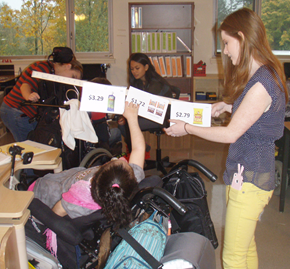Transition Planning
Transition is the process of preparing young people with deafblindness to move successfully from a world they know to a world they don't. (PA Partnership for the Deafblind)
Transition planning helps youth with deafblindness get ready for college, vocational training, employment, and community life once they leave school. The Individuals with Disabilities Act mandates that it begin by the time a student turns 16 (some states require age 14), but because students with deafblindness have highly complex needs, many professionals recommend starting earlier (Zatta & McGinnity, 2016). It’s a highly individualized process that takes a team effort over a number of years. In addition to the student, family, and educational team members, it involves collaboration beyond the school system with relevant adult services such as vocational rehabilitation, developmental disabilities agencies, and agencies serving adults who are Deaf/hard of hearing or are blind or visually impaired. The inclusion of members with a strong understanding of deafblindness on the team is essential.

Beyond formal transition planning, preparation for adult life really begins much earlier in a child’s life with activities that promote self-determination, establish community connections, and build skills that are needed for future employment and lifelong learning.
See also:
Introductory Resources
Learn More
Transition to Adulthood and Community Living (OHOA Module)
READY Tool: Readiness Evaluation of Transition to Adulthood for Deaf-Blind Youth
Paths to Transition (Perkins Website)
Offline Resource
Article: Zatta, M., & McGinnity, B. (2016). An overview of transition planning for students who are deafblind. American Annals of the Deaf, 161(4), 474-485.
Book: Bridgeo, W., Caruso, B., & Zatta, M. (2014) Total life learning: Preparing for Transition – A curriculum for all students with sensory impairments. Perkins School for the Blind.
References
Pennsylvania Partnership for the Deafblind. (2010). Hopscotching your way through transition: Questions parents need to ask as their child with deafblindness moves from school to the adult world.
Statewide Parent Advocacy Network & Perkins School for the Blind. (2011). Transition to adult life for youth with deaf-blindness: A parent mini-guide.
Zatta, M., & McGinnity, B. (2016). An overview of transition planning for students who are deafblind. American Annals of the Deaf, 161(4), 474-485.
KEEP EXPLORING